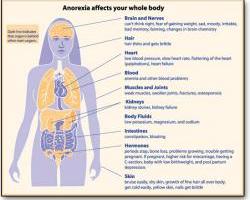Anorexia Facts
 Approximately 24 million people in the United States suffer from an eating disorder, according to the National Association of Anorexia Nervosa and Associated Disorders.
Approximately 24 million people in the United States suffer from an eating disorder, according to the National Association of Anorexia Nervosa and Associated Disorders.
One of the three most common eating disorders is anorexia, which can be deadly if left untreated.
Startling Anorexia Statistics
- • People who suffer from anorexia see themselves as overweight when, in fact, they are extremely underweight, even emaciated.
- • Anorexia is technically defined as the “inability of a person to maintain body weight within 15 percent of the Ideal Body Weight (IBW).”
- • Despite being extremely thin, people with anorexia still pursue losing more weight and may engage in extreme dieting, binge eating followed by purging, and/or excessive exercise to shed the excess calories consumed.
- • Others may abuse or misuse laxatives, enemas or diuretic medications in order to get “rid” of any food that this consumed.
- • Complications stemming from anorexia may include brittle hair and nails; yellowish, dry skin; thinning bones, or osteoporosis; muscle wasting and weakness; low blood pressure; heart and/or brain damage; shutdown or failure of multiple organs; infertility; feeling tired, or lethargy, all of the time; and amenorrhea.
- • Studies suggest that about 1 percent of adolescent females are affected by anorexia.
- • Anorexia is the third-most common chronic illness in adolescents.
- • Approximately 10 to 15 percent of people who suffer from anorexia are male.
- • Men are less likely to seek treatment for anorexia because they believe it is a “woman’s disease.”
- • People with anorexia are 18 times more likely to die early compared to healthy individuals of similar age.
Sources: National Association of Anorexia Nervosa and Associated Disorders
 Eating Disorder Self Test. Take the EAT-26 self test to see if you might have eating disorder symptoms that might require professional evaluation. All answers are confidential.
Eating Disorder Self Test. Take the EAT-26 self test to see if you might have eating disorder symptoms that might require professional evaluation. All answers are confidential.